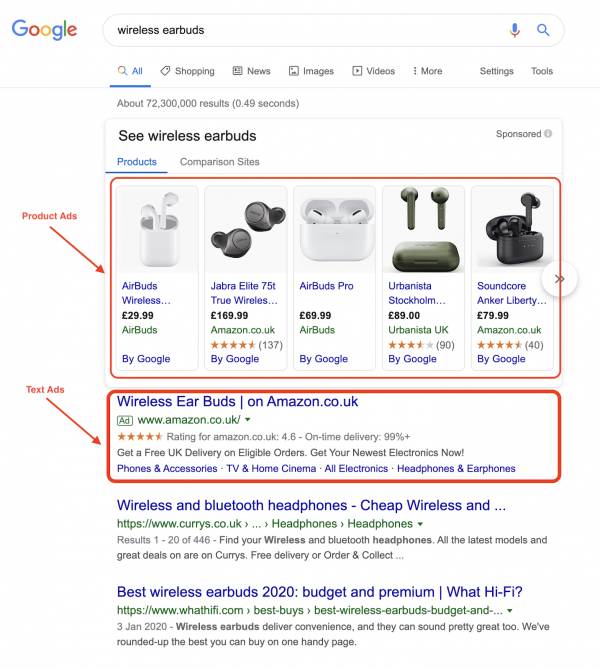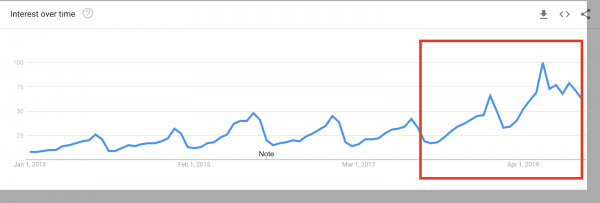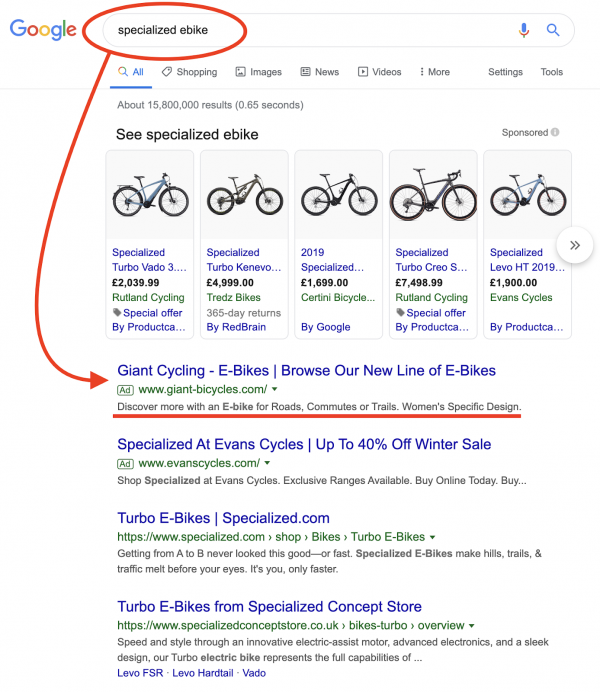When launching a new product, the objective will be to drive sales and maximise awareness. To a point, sales generated will be proportional to the number of qualified buyers who see your product and visit your website. The problem is, nobody has ever heard of it, so where do you find the buyers?
Digital marketing has become a great way to spread the word, generate awareness and is a route to direct sales. A great place to start marketing a new product for direct sales would be Google Ads. This is an advertising service offered by the search engine giant which enables advertisers to gain exposure in its search engine and across other websites, Google is partnered with. It’s a great way to reach audiences who are looking to solve a problem or satisfy a need that your product addresses.
Why Google Ads?
Flexibility - Google Ads can reach customers via tonnes of targeting options. In addition to using search keywords in the search engine, a number of targeting options can be layered over this, along with audience targeting across Google's display network.
A high-speed alternative to Search Engine Optimisation (SEO) - Google Ads can be implemented quickly, sending visitors to a website within a matter of hours. SEO can yield great results but takes a long time to gain traction and deliver value.
Measurability - Google provides free tracking tools within its advertising platform, Everything can be measured, from ad impressions to the number of clicks, cost, sales and revenue.
Budgeting - It will operate within a specific budget and can even be distributed across different campaigns designed to meet different objectives.
Scalability - Google Ads can be scaled, sometimes by simply allocating more budget if the audience is larger than you can reach initially or by expanding your targeting in terms of keyword coverage or audiences.
When Can Google Ads Be Used
All you need to advertise on Google is a Google Ads account and a website to promote. So you don’t have to wait until a product is ready for market. Google Ads can be used before, during and after the launch with different strategies adopted suit.
A pre-launch strategy could be to generate interest and awareness by driving users to a website showcasing your product. User details could be collected for future mailing lists when the product is finally launched to bring interested customers back, perhaps with initial offers and incentives for first purchasers. During the launch, additional ads could be placed on specialist websites to drive interested and qualified audiences at scale, again highlighting added incentives if this is part of the strategy. Following the launch, ads could drive direct sales by targeting users searching online or again via interests. These could be combined with audiences in remarketing lists, bringing users back to your website who showed an interest at the pre-launch stage.
Formulate Your Product Launch Marketing Plan
Google Ads offers a choice of advertising formats and unique targeting options, all of which can be combined to gain exposure to potential buyers. The strategy for this may vary on who your product is aimed at.
Google Search Ads would offer access to an audience with the highest purchase intent. These are ads served on the Google Search Engine, which are displayed based on the keywords users search with. You’ll see them right at the top of search result pages in two different formats, one being text ads, and the other being Product ads.

By targeting keywords applicable to your product and your customer's needs, you can serve ads to the customers based on their search intent, so getting your brand and product in front of them when they are at the consideration and buying stages of their buying journey.
To determine what keywords to use, Google provides a Keyword Planner, which can provide some insight into what search volumes are online and the cost. So, ideas on potential keyword strategies can be researched before implementation.

Free Report
Spot Errors, See Strategies,
Our Free Report Reveals Key E-Commerce Fixes.
Book Your Call
Filling the Sales Funnel
It’s possible that in the case of new and innovative products, or perhaps niches with very small audiences, people don’t think to search for what you’re selling, as they are unaware of the solution or perhaps even the problem it solves. In these cases, if nobody searches for your chosen keywords, nobody sees your ads, resulting in fewer website visitors.
In this situation, a couple of strategies entail looking a little further up the funnel.
Google Display Network - One place to look is the Google display network. The reach of this is far greater than that of the search engine. Google claims that as users, we spend around 95% of our time online reading, and the display network helps reach this audience.
The Google Display Network places ads on websites partnered with Google, all of which are categorised by either topics or user interests, so these can be selected based on the habits of your ideal customer. An example use may be that you have a niche product that would appeal to users interested in technology, so these interests can be targeted. Alternatively, this can get much more specific by overlaying a topic and going for ad placements on websites that specialise in the subject of your product.
Remarketing Lists for Search Ads (RLSA) - Another option is to use retargeting, which could work in tandem with the above. Having generated interest from users across the display network, users who are higher up the funnel, a search campaign could then target users based on the keywords they search within the search engine as they near the bottom of the funnel.
RLSA campaigns can essentially target ‘only’ those users who showed an interest in your product previously and so qualified for placement in your remarketing list. This could be anything from spending a certain amount of time on the website, accessing a key page or signing up to receive more information by email.
Some example uses of RLSA campaigns could be;
Brand Campaigns - which target users who search with keywords relating to your brand and your product at the discovery phase while generating interest pre-launch. Keywords could include your brand, product name, model, specifications, applications, straplines, where it was showcased etc. This main purpose is to maximise visibility while your SEO catches up. Regarding brand-new businesses or websites, Google will have had little time to index your website for organic search engine listings.
Similar Products - This strategy would be using keywords relating to products already in existence, not necessarily direct competitors, but those that almost solve the problem that your product solves.
One example could be before the rise of the electric scooter. There were few searches online until awareness grew, yet this device could apply to various uses, from kids' toys to urban commuter vehicles. Of course, being new to the market, nobody searched for an e-scooter or electric scooter in the search engines. In cases like this, a remarketing search campaign could, in fact, target keywords as broad as “commuter bikes”. Though the product isn’t a commuter bike, it will appeal to users looking to solve the problem of getting around the city. They would also be pre-qualified if they had already shown an interest in this product from a display ads campaign earlier in their buying journey.
Search Trends for e-scooter (Google Trends)

Conquesting - A further use of Remarketing in the Search Engine would be to target keywords of alternative and competing products, of which yours is a valid alternative. The fact that users are in your remarketing list has qualified them as being interested, even though your product may not be the norm. So going after keywords of competitor products will get you in front of users when searching for them. This strategy can be applied outside of remarketing if you want to aggressively go after searchers considering the competition.
The below example is Giant Bicycles competing for search traffic looking for Specialized bikes, a competing brand.


Getting Started With
Performance Max
Download Our Step-by-step guide to getting started with Performance Max Shopping Campaigns for your Shopify Store
GET YOUR FREE EBOOKFREE EBOOK
Data, Insights and Search Engine Optimisation
Search Engine Optimisation (SEO) will form part of your product launch marketing plan, and due to the labour invested in SEO and the time it takes to gain momentum, it's imperative that the strategy is right from the outset. The keywords you choose to integrate into the strategy will be paramount to the success of your SEO efforts driving any future revenue.
Google Ads campaigns can generate a lot of search engine data relating to keywords and their performance for your website. Search volume, cost, sales, revenue, and competition overlap. These are all important metrics when managing a Google Ads campaign, and in the case of search, they can also provide valuable insight into the value of keywords searchers use to find your product. Armed with this data, you can validate which keywords to integrate into your long-term SEO and content strategy.
Conclusion
While figuring out how to generate awareness and sales for your new product launch can be daunting, generating awareness and sales with advertising designed for high volume is possible. You can make the most of what’s out there with the right approach. With an understanding of the targeting options and platform functionality of Google Ads, a strategy can be formulated to carve out your own audience. In essence, this article has discussed ways of using Google Ads when search volume is lacking, and there are many strategies that can be applied beyond what has been discussed here.
Like what you read?
You can sign up for our Newsletter, and get notified by email as we publish new hints, tips and guides.

Book A Discovery Call
Looking for tailor-made PPC strategies? Our team is here to help you maximize your online store's potential. Book a discovery call with us for personalised insights and solutions.
Book Your Free ConsultationBook Your Call